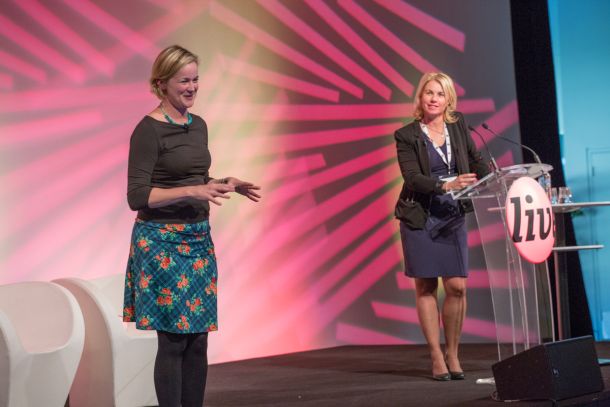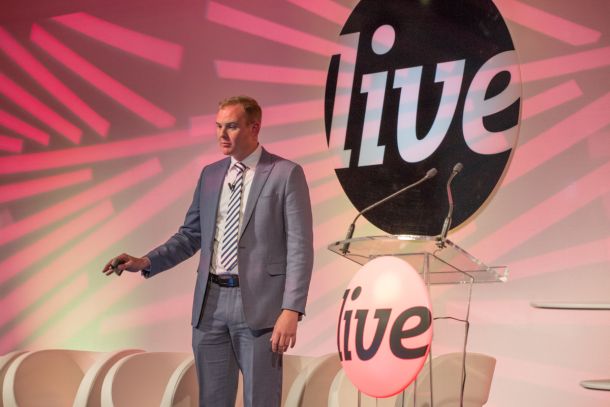The PKN + Food & Drink Business LIVE: Disruptive Innovation Industry Forum proved inspirational and informative as speakers shared insights, stories and strategies for creatively moving brands forward.
Held at the Royal Randwick Racecourse in Sydney on Thursday last week, the event saw a top line-up of presenters and panellists share their ideas on what is disrupting the food, beverage and packaging space currently, and what the future holds.
Here follows a brief summary of some highlights of the day, with a more comprehensive report to be published in the September-October issue of PKN and the September issue of Food & Drink Business.
BE A CHANGE DRIVER
Motivational keynote speaker Richard Sauerman, AKA The Brand Guy, talked about the rapid rate of change we're faced with, and how we can choose to “change the world” using our unique “superpowers” rather than sitting on the sidelines. “What's your area of impact?” Sauerman asked. “Within that area, you have the choice to drive change. Set your sights on the moon and you'll reach the moon. If you want to be disruptive then be bold, audacious and outrageous.”

DISRUPTIVE DAIRY
Sales, marketing and innovation specialist at Bulla, Nick Hickford was able to share his journey of driving the dairy brand into new territory in partnership with creative startups. He described the company's move to give the everyday commodity brand of Bulla a stronger foothold in the super-premium market due to retail pressure and slipping market share. Price promotions were no longer working for Bulla, so, rather than continuing to spiral downwards, the team made a bold move towards change.
INSPIRATIONAL STARTUP
Thankyou Group's Daniel Flynn is leading the charge in Australian social enterprises, and his inspirational talk at our forum moved every member of the audience.
Named 2013 Victorian Young Achiever of the Year, 2014 Victorian Young Australian of the Year, and recently the 2015 EY Emerging Entrepreneur of the Year (Southern Region), he has been recognised for his success in building a business which gives its profits to support projects in the developing world.
Flynn was convicted by the fact that 900 million people in our world didn’t have access to safe drinking water, and that Australians spend $600 million annually on bottled water – “an industry that seemed ludicrous when you consider the fact that we can all get water from the tap for free”.
“When I asked the question of myself, ‘What if that were me without access to water?’ that’s when it all started,” he said.
“I imagined my sisters having to walk for days to collect water, or me having to do it for them. I felt like something could be done – should be done – and I could be part of it. Along with my co-founders, we came up with the idea to join these two extremes together to make a difference. So, we decided to take on the multinationals and create Thankyou Water – a bottled water company that would exist for the sole purpose of funding safe water projects in developing nations.”
The Thankyou movement includes three different brands: Thankyou Water, Thankyou Food and Thankyou Body Care. Now, they provide safe water access for those in need, as well as access to food and hygiene solutions.
Flynn shared the highs and lows of getting a startup off the ground, and the challenges they still face. He said it was always important to know the 'why' behind your business ambitions.

LEANING IN
Tim McLean is the managing director of TXM Lean Solutions a firm believer in the power of Lean in helping the food and beverage industry “increase value and reduce waste”.
He spoke about the importance of asking what the customer wants and values before using Lean to match their needs, rather than simply using it as “a tool to speed things up”.
DIGITAL DISRUPTORS
Comet Line Consulting director David Baveystock shared key insights into the digital business models making the biggest dent on traditional channels in food and beverage.
Pointing out that supermarket customers in the digital age were “ripe for the picking” (to quote Greg Stirling), he said the six key areas of disruption were online retail, meal kit providers, online meal delivery portals, diet-based businesses, direct delivery of prepared meals, and online marketplaces.
“The food industry will change,” Baveystock said. “You need to either disrupt your own business or face the serious risk of being disrupted.”
Creatovate managing director Dermott Dowling spoke about how food and beverage companies can break out of their “innovation paradigms” and explore new ways of thinking.
“Innovation stems from a problem, and entrepreneurs start conversations which drive it forward,” Dowling said.
He listed key digital disruptors as Dish'd in frozen meals, Kogan Pantry in groceries, and Marley Spoon in fresh meal solutions.
Dowling spoke about the importance of breaking apart data analytics, assessing the 'why' behind the 'what', and seeking ways to improve your business model through strong hypothesis and customer development models which “get you out of the building”.
“Startups spend their time out there to validate their hypothesis on a limited budget,” he said. "They are forging ahead by doing things differently."
PRIVATE LABEL PUSH
Supermarket retailers are pursuing growth aggressively through private label, which enjoys over 21 per cent of the grocery market (excluding fresh produce), and Coles Brand senior packaging technologist Adam Robinson provided insights into the direction private label packaging is taking.
Robinson said private label products offered a strong value proposition for consumers, with half of all shopping trips including purchase of a private label product.
The Coles Finest range demonstrates the retailer's move towards premiumisation, and he said consumers were now convinced private label brands were just as good as name brands.
Robinson gave examples of where Coles Brand is a category disruptor and innovator, including its water bottles now made of 100 per cent RPET instead of virgin plastic.

THE DIGITAL SHELF
SGK Asia-Pacific managing director Adam Ransom had several insights into the growing importance of the digital shelf.
In the US in 2013, he said, the total consumer packaged goods (CPG) revenue was $660 billion, and $8 billion of that came from online sales. Estimates for 2018 are $36 billion of $718 billion – showing that more than half of the growth over the next few years will come from online sales.
“Manufacturers will see increased competitive intensity as startups source private label products, and CPG players will be slow to adapt,” Ransom said.
“FMCG companies need to speak directly to the consumer through direct, conversational language [on the packaging] rather than through the retailer,” he said. “Packaging needs to become part of the customer experience.”
Ransom predicts a stronger move towards augmented reality, where packaging grabs the consumers attention by superimposing graphics, audio and other sensory enhancements in real time.
DOWN TO EARTH
Gourmet Garden's head of marketing and innovation, Jacqui Wilson-Smith, was able to tell the processing and packaging story behind the company's award-winning 'lightly dried herbs' product launch.
“We had the herb tubes but there was need for differentiation,” she said.
After trialling two different, new, pack formats and engaging in the well-known Design Led Integration program, the company engaged in disruptive thinking which saw them entering into the lives and experiences of consumers in a fresh new way to find out their cooking and packaging woes. Gourmet Garden worked with designers and packaging specialists to produce a herb caddy which can fit in the fridge door and lifted out and moved to the kitchen bench for cooking. It stores and organises squeezy tubes of stir-in pastes and the Lightly Dried pouches. A patented food innovation means the herbs stay fresh for four weeks once opened, and the result was commercial success and a win in the Australian Good Design Awards last year.
“You never change things by fighting the existing reality,” Wilson-Smith said, to quote Buckminster Fuller. “To change something, build a new model that makes the existing model obsolete.”

HUMAN-CENTRED DESIGN
Michael Grima is the founder of QDesign Enterprises, with a special interest in using consumer insights to determine packaging format and brand position.
He works with creative agencies, manufacturers, packaging designers and brand owners to ensure a positive packaging experience with the brand. He believes in the importance of “going into the wild” with focus groups, where consumers respond naturally to their environment – and their packaging.
He shared some of his “human-centred design methods”: Engage consumers' functional needs and emotional desires; use consumer insights to determine the packaging format and brand position; search outside the category for inspiration and innovation; watch what people actually do rather than what they say they do.
DIGITAL PRINTING POSSIBILITIES
Jason Beckley is in charge of HP's labels and packaging segment, and a big believer in the possibilities of digital printing when it comes to customisation and personalisation.
Since 55 per cent of supermarket buying is unplanned, Beckley said it was important to stand out from the crowd. He used Coke's 'share a Coke' campaign, and its customised bottle design initiative, to prove that digital technology in print is “one-off, seasonal, and event-driven". He also gave the example of Heinz' move into augmented reality.
“There is no need to fear the digital age,” Beckley said.
“It's here to stay. We just need to make sure it links with reality and engages consumers.”

TURNING TRENDS INTO DESIGN
Taby Taylor-Ziane, strategic director of Boxer & Co, gave a colourful talk about consumer trends and how they translate into disruptive innovation in packaging, focusing on global examples to expand the audience's inspiration horizons.
She defined disruptive packaging as “creating a pack that throws a category into disorder and breaks the codes to provide something new… and it has been proved to have real impact on shopper behaviour.
“But just creating some crazy wacky packaging isn't going to cut it,” she said, and went on to identify what her team believes are the BIG 3 of creating successful disruptive packaging:
Be Brave - Transcend the norm – don’t be afraid to break the category codes
Be Bold – go for deep engagement and connection – understanding people at a bigger picture level, beyond the confines of your category helps you connect with them in a more meaningful way
Be True – don’t’ stray from your brand essence and purpose, people smell a fake a mile off…
The Disruptive Innovation Industry Forum, powered by PKN and Food & Drink Business LIVE, will return to Sydney in 2016 with another top line-up of speakers from the food, beverage and packaging industries.












